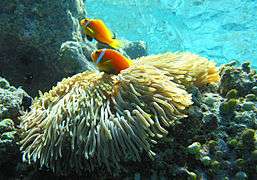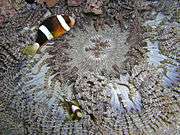Stichodactylidae
Stichodactylidae is a family of sea anemones that contains the genera Stichodactyla (carpet anemones) and Heteractis. These sea anemones exclusively reside within the shallow waters of the tropical Indo-Pacific area and are in the main family of sea anemones that hosts several varieties of clownfishes.[1] Most sea anemone species are harmless to humans, but at least some Stichodactyla are highly venomous and their sting may cause anaphylactic shock and organ failure (notably acute liver failure).[2][3] In contrast, the venom of Heteractis has shown potential in treatment of lung cancer.[4]
| Stichodactylidae | |
|---|---|
 | |
| Heteractis magnifica with Maldive anemonefish and juvenile threespot dascyllus | |
| Scientific classification | |
| Kingdom: | Animalia |
| Phylum: | Cnidaria |
| Class: | Anthozoa |
| Order: | Actiniaria |
| Superfamily: | Actinioidea |
| Family: | Stichodactylidae Andres, 1883 |
| Genera | |
| |
Discovery
Collingwood C. first discovered Stichodactylidae back in 1868 after taking note on the existence of gigantic sea-anemones in the China Sea, containing quasi-parasitic fish.[5]
Genera and species
The following species are recognized within the family Stichodactylidae:[6]
- Genus Heteractis
- Heteractis aurora
- Sebae anemone (Heteractis crispa)
- Heteractis magnifica
- Heteractis malu
- Genus Stichodactyla (carpet anemones)
Gallery
 Stichodactyla tapetum
Stichodactyla tapetum Heteractis aurora
Heteractis aurora
References
- Fautin, Daphne G.; Allen, Gerald R. (1997). Field Guide to Anemone Fishes and Their Host Sea Anemones. Western Australian Museum. ISBN 9780730983651. Archived from the original on 14 April 2015.
- Garcia, Patricia J.; Schein, R.M.; Burnett, J.W. (1994). "Fulminant hepatic failure from a sea anemone sting". Annals of Internal Medicine. 120 (8): 665–666. doi:10.7326/0003-4819-120-8-199404150-00007. PMID 8135451.
- Nagata, Keiko; Hide, Michihiro; Tanaka, Toshihiko; Ishii, Kaori; Izawa, Masao; Sairenji, Takeshi; Tomita, Katsuyuki; Shimizu, Eiji (2006). "Anaphylactic shock caused by exposure to sea anemones". Allergology International. 55 (2): 181–184. doi:10.2332/allergolint.55.181. PMID 17075255.
- Ramezanpour, Mahnaz; da Silva, Karen Burke; Sanderson, Barbara J. S. (2013). "Venom present in sea anemone (Heteractis magnifica) induces apoptosis in non-small-cell lung cancer A549 cells through activation of mitochondria-mediated pathway". Biotechnology Letters. 36 (3): 489–495. doi:10.1007/s10529-013-1402-4.
- Attaran, Gilan & Javid, Pegah & SHAKOURI, Arash. (2015). Morphology and phylogeny of the sea anemone Stichodactyla haddoni(Cnidaria: Anthozoa: Actiniaria) from Chabahar Bay, Iran. TURKISH JOURNAL OF ZOOLOGY. 39. 998-1003. 10.3906/zoo-1310-4.
- "WoRMS - World Register of Marine Species - Stichodactyla Brandt, 1835". marinespecies.org. Retrieved 2018-04-07.